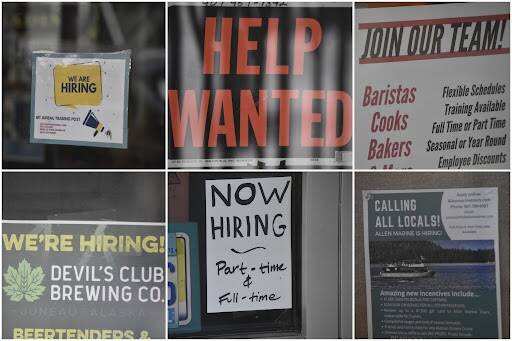Wanted: Librarians, bus drivers, police officers, a life guard. Pay varies by position, benefits aren’t what they used to be.
Vacancies are widespread in multiple City and Borough of Juneau departments, according to City Manager Rorie Watt, who provided a verbal update on staffing during this week’s Committee of the Whole meeting.
“We’re constantly talking about the shortage of staff, and it takes away from big picture stuff,” Watt said. “Everyone is doing well but it’s challenging and we’re all being the best we can.”
Watt said staffing is putting a strain on the city’s ability to prioritize certain things it would like to. As of Wednesday, the city has 23 open employment positions, some with multiple vacancies within them according to the CBJ website. The openings range from having been just recently posted in early August while others date back throughout the summertime and some even into late spring. Some of the open positions include a lifeguard, an accountant, a bus driver and police officers.
The city’s lack of workers doesn’t seem to be an isolated trend as a report released in late May found that one in five Alaska state jobs remains vacant, and across the country, there are more than 10 million job openings but only about 6 million unemployed workers according to a U.S. Chamber of Commerce report published last week. Watt said he urges other members of the committee to continue to be conscious of the lack of employees, and “don’t be too optimistic about adding new projects,” and said the city “needs a little bit of a reality check.”
He said the city department “hit hardest” by the issue is the Human Resources department which seems to be constantly “swamped” with doing tasks like hiring and onboarding new employees for all departments while simultaneously also being understaffed.
“Everyone just needs more services from the HR department than what is available,” he said.
He said it has also affected priorities for the public like the recent cutting of city bus routes, which he said is because the city can’t find enough drivers.
“Part of it’s what’s going on everywhere else,” said Assembly member Michelle Bonnet Hale in a phone interview with the Empire. “After COVID, the whole employment field shifted and the city was victim to these big economic shifts.”
Hale said while the lack of employees is due in part to the nationwide and statewide labor shortage, and thinks another very prominent contributing factor is a change in retirement benefits that is leading people to not find a reason to stay in government jobs for as long as they used to.
She said she thinks it first became an issue back in 2005 when legislation was passed that made Alaska the second state to switch from its defined benefit plan, more commonly known as a pension plan, to a 401(k)-style defined contribution retirement plan for teachers and for public employees. The switch — which was generally supported by Republican legislators and opposed by Democrats — was largely pushed by Republican legislators who were concerned with the underfunding of the state’s previous defined benefit plan which offered guaranteed retirement benefits for government employees with payouts that considered an employee’s salary, age and length of service.
“Frankly, it’s a move intended to make the government harder to administer because it’s harder to find people and it adds a burden,” she said.
She said it no longer gives people reason to stay in their positions at Alaska government jobs because people can leave their positions at any time to private counterparts and continue to maintain their defined contribution plan.
“They don’t need to stay, there’s no reason to stay,” she said. “Now when people see jobs that offer 25%, 50% more they walk and take their 401(k) with them — we’re a good employer until someone else is a better employer.”
She said she thinks the decision is backfiring on both the city and state levels and she thinks it needs to be switched back to help both governments bodies be able to retain employees.
And Watt agrees. He said he does think the switch back would be an asset, and said benefits built over time make a difference but “the truth of the matter” is that right now the legislation still stands and changing it would be a long-term effort. He said for now the city has to look to other ways to maintain employees for a long-term period to provide stable services.
“The shortage is pretty well documented, and everyone is having a hard time hiring, I think,” he said in a phone interview with the Empire. “Inflation is hard, I think employees have a lot of choices and it’s really challenging for a lot of reasons.”
• Contact reporter Clarise Larson at clarise.larson@juneauempire.com or (651)-528-1807. Follow her on Twitter at @clariselarson.

